Tear-gas tourism: do West Bank trips offer insight – or just thrills?
Critics of 'political tourism' say an afternoon of protests and stun grenades offers little benefit to visitor or host
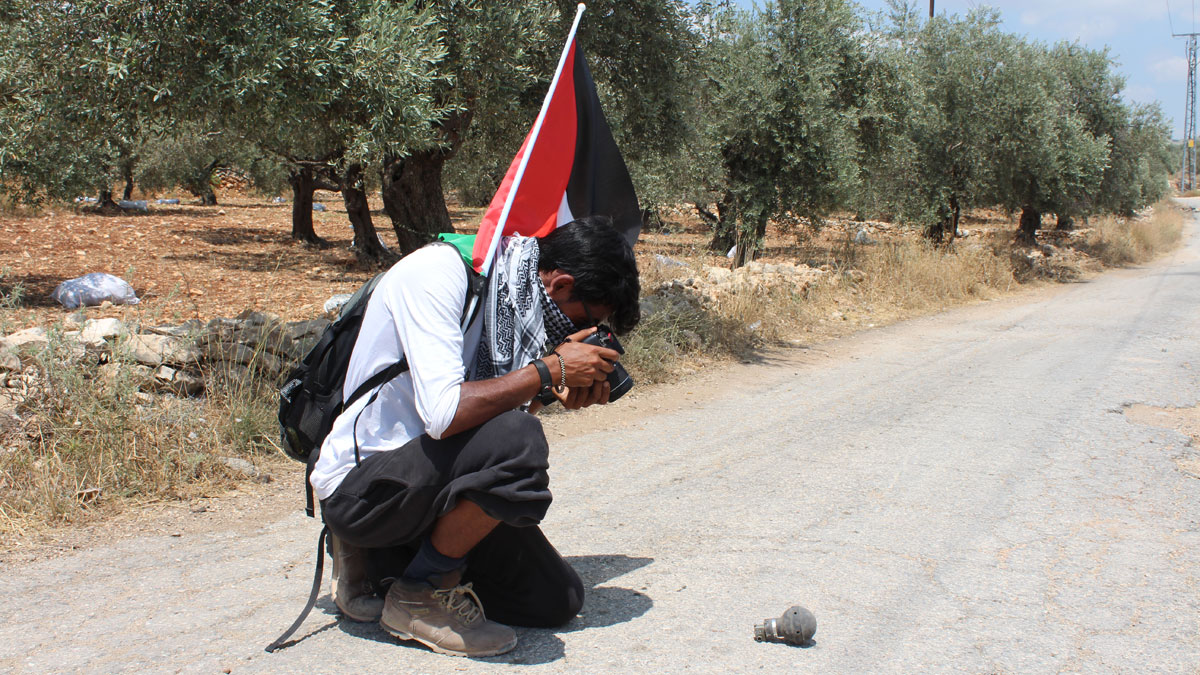
A free daily email with the biggest news stories of the day – and the best features from TheWeek.com
You are now subscribed
Your newsletter sign-up was successful
By Nigel Wilson
In the early afternoon heat, the villagers of Bil'in prepare for their weekly demonstration against the Israeli occupation. An old man adjusts a gas mask, while a group of young Palestinians wrap keffiyahs around their necks.
Hanging back, incongruous, a bus-load of elderly French tourists watch silently. A separate group of European backpackers and Asian exchange students bristles with nervous anticipation.
The Week
Escape your echo chamber. Get the facts behind the news, plus analysis from multiple perspectives.

Sign up for The Week's Free Newsletters
From our morning news briefing to a weekly Good News Newsletter, get the best of The Week delivered directly to your inbox.
From our morning news briefing to a weekly Good News Newsletter, get the best of The Week delivered directly to your inbox.
A few hundred metres away, across the valley, Israeli soldiers line up close to a parked armoured car, tear gas and stun grenades ready.
It's a familiar scene for those on both sides, but an entirely novel one for the people who have paid to be here. The Friday protest has become a weekly ritual for the villagers of Bil'in since the Israeli separation barrier was built close to the village, cutting off farmers from a swathe of their land.
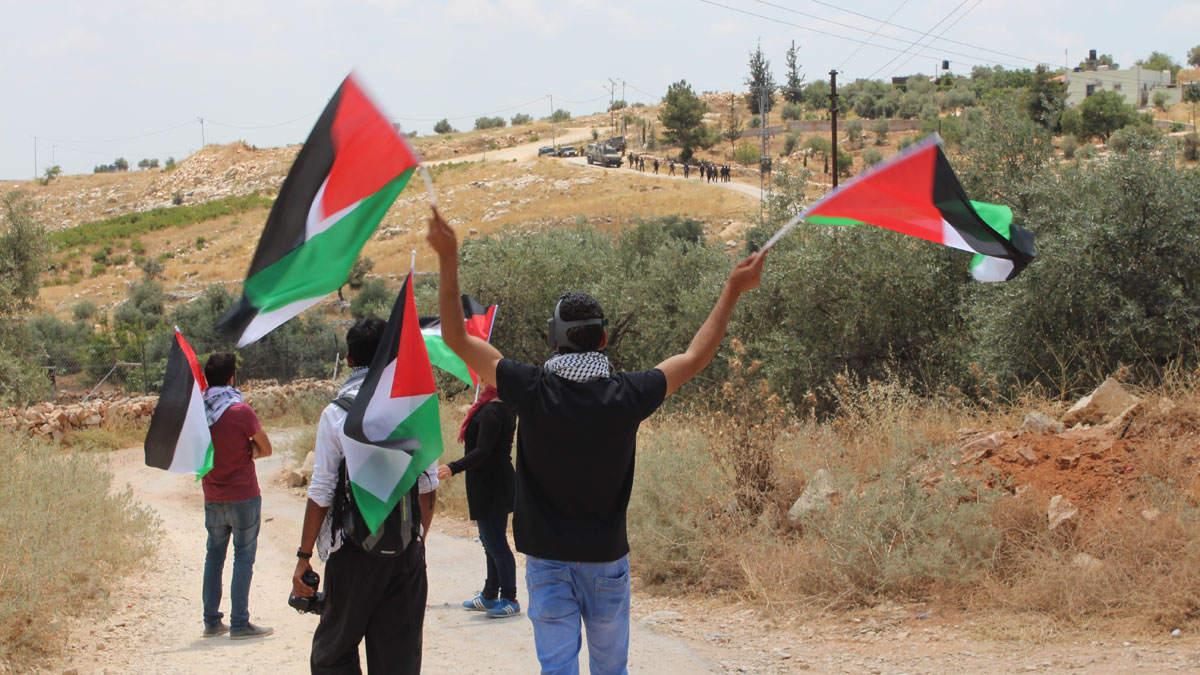
Bil’in residents wave Palestinian flags at the weekly protest against the Israeli occupation
A free daily email with the biggest news stories of the day – and the best features from TheWeek.com
Rateb Abu Rahmah, who is one of the protest organisers, hands out shiny new Palestinian flags to the younger tourists, while a band of international activists congregates with their own well-used banners. The villagers lead the march toward the soldiers, chanting anti-occupation slogans. The activists and tourists eagerly join in.
Over a loudspeaker, the soldiers warn the demonstrators to turn back before promptly launching a barrage of stun grenades and tear gas.
The tourists and villagers retreat, tentatively at first, but more swiftly once the tear gas wafts across the valley. Eyes streaming, gagging and spitting from the effects of the gas, they take refuge behind walls and bushes.
The scene repeats itself twice before the Israeli army retreats. As the gas clouds disperse, one tourist stuffs a few used canisters into his bag as a memento, others pose for pictures. Today's encounter lasts no longer than an hour.
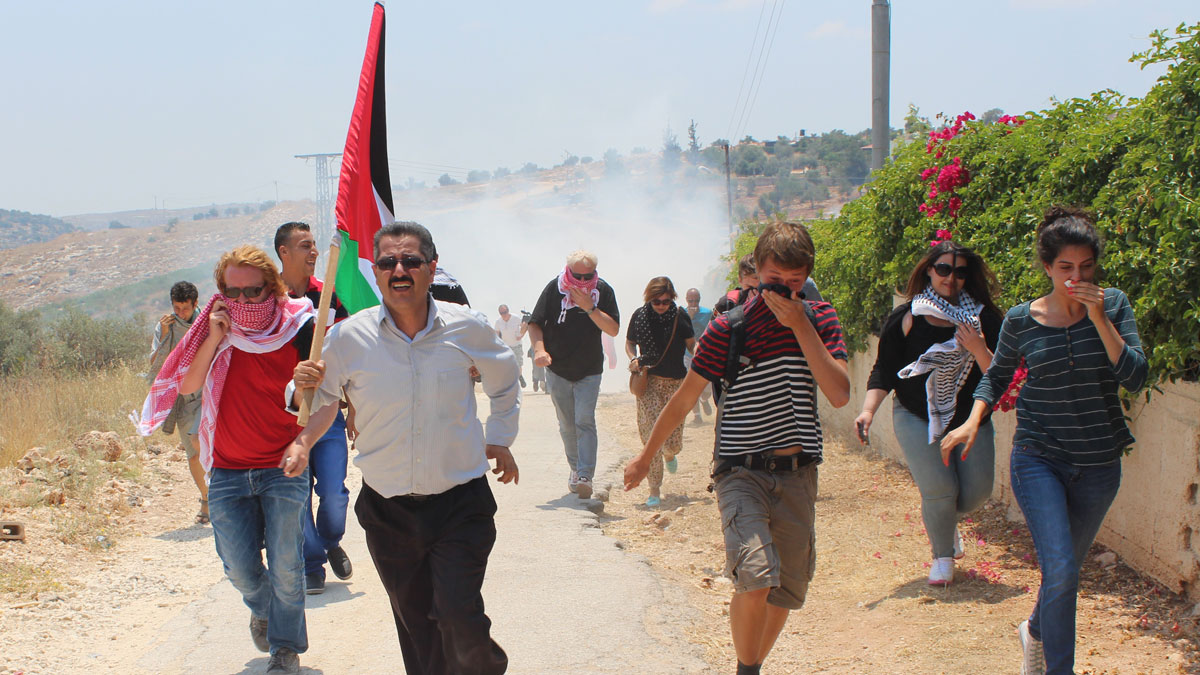
Dr Rahmah runs from a tear gas cloud, along with internationals
Adnan, a British backpacker on the tour, became interested in the conflict after studying politics at university. "It was shocking and exciting at the same time, because I never expected to experience anything like that," he says. "It was insane. It enforced the idea in my head that the IDF don't see Palestinians as equals."
A Belgian traveller, Dylan, says the protest felt "useless," noting there were more internationals than Palestinians present. "The only goal was to hide from the tear gas."
Watching and taking part in the weekly Bil'in demonstration is offered as part of a 'political tour' by a guesthouse called Hostel in Ramallah located in the de-facto Palestinian capital. Its laid-back co-owner Bobo has taken international tourists to the Bil'in most weeks for the past two years.
"It wasn't precisely our plan," he says. "When we opened we started making political tours to different areas. But there was a demand from different travellers for Bil'in."
The village of around 2,000 people came to international attention when the documentary 'Five broken cameras' was nominated for an Academy Award in 2012. It portrayed the villagers' protests against the construction of the separation wall through village land that began in 2005. The situation initially drew international activists and, more recently, political tourists too.
"We don't try to advertise it a lot," Bobo says. "I was happy but kind of scared because I don't want people to just see this face of Bil'in. But I was happy that people are determined to come and see what's going on."
The tour costs 15 shekels per person (£2.50) plus a tip, which is about the same price as a chicken kebab in Ramallah. After the demonstration, Bobo takes the backpackers around a number of local sites, including a monument to a man killed in a demonstration and a local farm, before eventually taking them to the imposing separation wall itself. The tourists have a chance to meet villagers along the way, as Bobo recounts Bil'in's recent history.
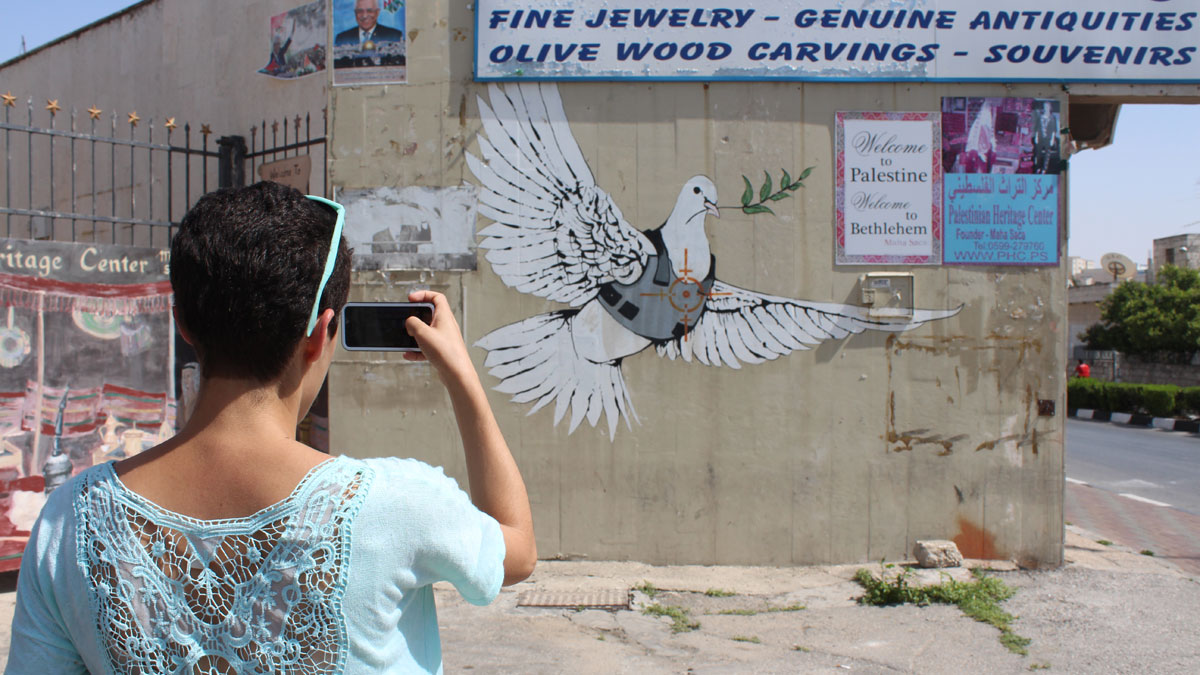
A tourist takes a picture of a Banksy on the separation wall near Bethlehem, Palestine
Dr Rahmah, a Bil'in resident and veteran leader of the weekly demonstration there, welcomes the presence of international tourists, as well as activists. "Any person who comes here and participates with us, he helps us," he says.
Dr Alex Koensler, research fellow at Queen's University Belfast, says that while political tourism can offer a space where new transnational communities can form, there are dangers too. Visitors with entrenched views about a political situation risk being blinded by their opinions and missing opportunities to engage with local communities.
Koensler is concerned that political tourists might "simplify or entertain dogmatic ideas" about the realities they’re exposed to. "On short term visits, there might not be enough time to actually change those opinions or to engage with the local context" he says. This, he believes, would prevent them seeing the full picture in all its complexity.
If tourists ignore local contexts, they risk making a bad impression on local communities, says Koensler. "Political tourists may want to show solidarity but [their visits] might be short – just a coffee. This could reinforce negative ideas they have about Western people."
Political tourism is not a new phenomenon, but its integration into the tourism sector is a recent trend that's not limited to this particular conflict. A handful of operators now entice the curious to political hotspots across Europe, Asia and Africa.
The British company Political Tours markets trips to Iran, North Korea and Ukraine and is planning to take groups to observe the US elections next year.
"There are a group of people out there who aren't conflict junkies but don't want to spend time just sitting by a pool or going around a museum," says company director Nicholas Wood.
Trips typically last around ten days and aim to provide up to 12 tourists with a nuanced overview of a political situation, says Wood. "It's not just bout doing a day trip to go and just see something, it's trying to provide you with an in-depth understanding." When it comes to visiting the West Bank as an independent traveller, most operators offer only the former.
The majority are run by Israeli companies out of Jerusalem or Tel Aviv, meaning the Palestinian economy currently sees little benefit. It is easy to leave a Jerusalem hostel, visit Bethlehem's religious sites, hunt for the Banksy graffiti on the separation wall there, and return to base without spending a shekel in a West Bank business.
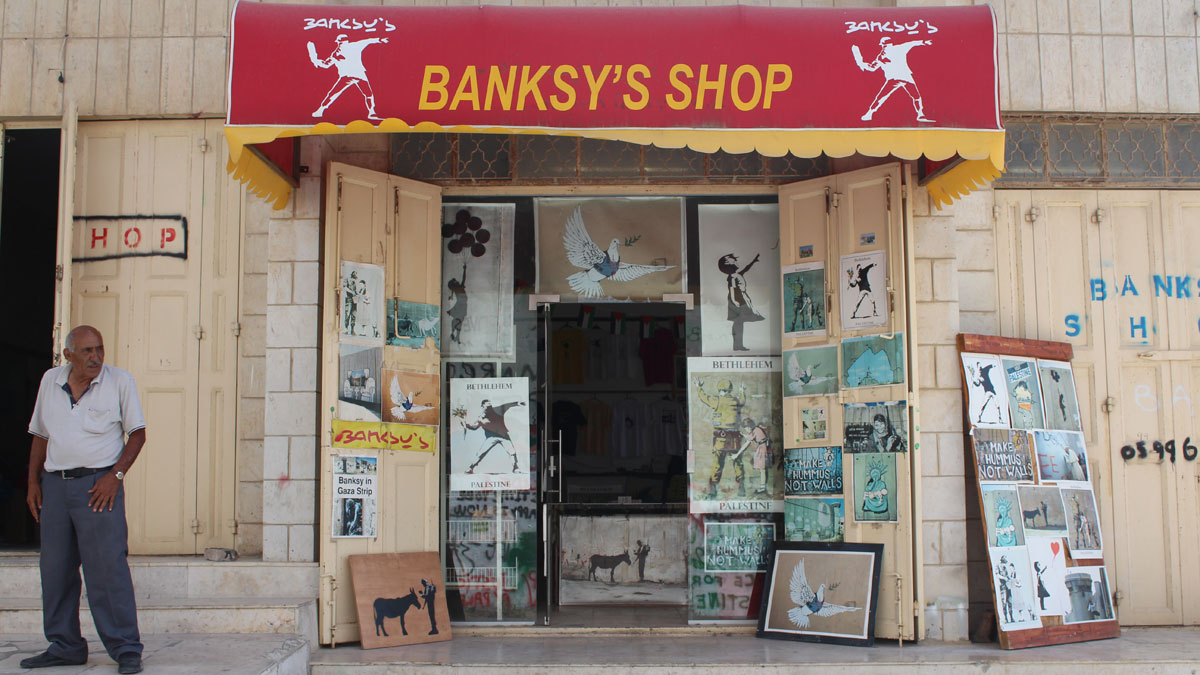
Banksy's shop opposite the separation wall near Bethlehem, Palestine
The fledgling Palestinian tourism industry has been slow to capitalise on the appetite for political tourism, but there are signs this is changing, albeit slowly. Area D hostel opened in Ramallah in 2014 and offers a range of political tours. One trip takes in a visit to a Palestinian village, almost encircled by expanding settlements, where tourists can buy locally sourced produce and drink tea with some of the residents. This follows with a visit to the so-called seam zone, where Palestinian farmers have been cut off from their land by the separation wall, a stop at the ancient archaeological site of Sebastiya, and lastly dinner at a Nablus restaurant renowned for its Musakhan – roasted chicken on taboon bread, garnished with fried onions and pine nuts.
These kinds of networks that connect Palestinian businesses and international tourists are small for now. But in terms of developing the Palestinian tourism sector, they could play an important role in benefitting local communities, as well as opening the eyes of international tourists who pass through.
-
 What to know before filing your own taxes for the first time
What to know before filing your own taxes for the first timethe explainer Tackle this financial milestone with confidence
-
 The biggest box office flops of the 21st century
The biggest box office flops of the 21st centuryin depth Unnecessary remakes and turgid, expensive CGI-fests highlight this list of these most notorious box-office losers
-
 What are the best investments for beginners?
What are the best investments for beginners?The Explainer Stocks and ETFs and bonds, oh my
-
 Epstein files topple law CEO, roil UK government
Epstein files topple law CEO, roil UK governmentSpeed Read Peter Mandelson, Britain’s former ambassador to the US, is caught up in the scandal
-
 Iran and US prepare to meet after skirmishes
Iran and US prepare to meet after skirmishesSpeed Read The incident comes amid heightened tensions in the Middle East
-
 Israel retrieves final hostage’s body from Gaza
Israel retrieves final hostage’s body from GazaSpeed Read The 24-year-old police officer was killed during the initial Hamas attack
-
 China’s Xi targets top general in growing purge
China’s Xi targets top general in growing purgeSpeed Read Zhang Youxia is being investigated over ‘grave violations’ of the law
-
 Panama and Canada are negotiating over a crucial copper mine
Panama and Canada are negotiating over a crucial copper mineIn the Spotlight Panama is set to make a final decision on the mine this summer
-
 Why Greenland’s natural resources are nearly impossible to mine
Why Greenland’s natural resources are nearly impossible to mineThe Explainer The country’s natural landscape makes the task extremely difficult
-
 Iran cuts internet as protests escalate
Iran cuts internet as protests escalateSpeed Reada Government buildings across the country have been set on fire
-
 US nabs ‘shadow’ tanker claimed by Russia
US nabs ‘shadow’ tanker claimed by RussiaSpeed Read The ship was one of two vessels seized by the US military